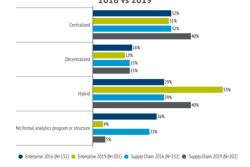
The supply chain analytics market is likely to witness growth due to increasing awareness about benefits of handling business data along with forecasting accuracy in supply chain analytics solutions. Rapid increase in volumes of business data across industries have prompted the need to adopt analytics solutions in order to convert raw data into meaningful information.
Supply chain analytics refers to balancing supply and demand along with corporate strategy in order to boost sustainability, profitability, and reduce inventory cost. To achieve this balance, supply chain planners access historical and real time data, which is categorized into outliers, trends, and exceptions.
Supply chain analytics provides opportunities to accelerate growth by enhancing strategic decision making, optimizing ROI, and leveraging procured insights. This also allows the companies to strengthen their market position. According to a report published by Grand View Research, Inc., increasing use of machine learning in supply chain analytics is anticipated to witness a substantial growth over the years.
With the availability of a large amount of data, the supply chain planners are able to make informed decisions. Machine learning enables forecasting with no need of data inspection as it is an application that mainly uses artificial intelligence (AI). It improvises from experience without being specifically programmed.
Advantages of Machine Learning Technology
Machine learning uses algorithms to accurately determine the factors that are responsible for the growth of a supply network. It uses different learning methods such as supervised learning, unsupervised learning, and reinforcement learning. It is also responsible for inspection of the inbound quality automation and to find the horizontal collaboration synergies between multiple shipper networks.
Machine learning is used in supply chain analytics to identify product damage using machine sensors. These sensors are available in all types and are installed in any preferred device of the customers’ choice. They can take various forms from light and heat sensors in trucks and containers to detect overheated cargo to computer vision technology to scan inbound goods for damage during inventory stocking. These sensor systems automatically send notifications and help in determining the faulty parts, thereby minimizing loss and disaster.
Top 4 Machine Learning and AI-based Techniques
Machine learning and AI-based techniques are the next gen supply chain and logistics technologies that are recently being developed. The technology is profitable due to its ability to solve complex problems along with effectively handling issues related to delivery and prices. The most daunting task for supply chains is the issue of logistics optimization in order to get the materials required and to complete the production process on time. Applying machine learning algorithms and AI-based techniques to improve supply chains begins with the use of data sets that have the capability to handle complex processes.
1. Predictive Analytics
Demand forecasting in predictive analytics enables companies to take decisions regarding funds management, planning and production, product pricing, and raw material purchase. Machine learning models provide these predictive analytics for demand forecasting to identify hidden patterns in historical data. For instance, Facebook uses predictive analytics to show news feed according to the interests of the user.
2. Inventory Management
AI has different enhancing capabilities and one of its major characteristics include vision ERP that turns critical business data into knowledge. It also enables faster identification and image processing making image classification feasible, which accurately determines objects in images outperforming humans. This promotes supply chain management as computer vision enables accurate inventory management. For instance, Target, a retail giant, tested a system in which inventory on store shelves can be tracked by a robot equipped with a camera.
3. Transportation Management
Intelligence in shipping and logistics promotes supply chain management as more accurate shipping reduces labor and transportation costs, and provides eco-friendly operations to increase output. The autonomous vehicles industry is an example of intelligence based transportation for reducing the shipping time. Autonomous vehicles, powered by AI and machine learning, are likely to have positive impact on logistics optimization and transportation management.
4. Optimized Procurement Management
Procurement management helps companies purchase goods and services from external suppliers to comply with internal needs. Procurement optimization results in company reaping profits due to efficiency in procurement processes. Machine learning and AI based technologies provide chatbots that are used to get instant information such as determining accurate shipment status, stock price, and stock availability. This also helps in simplifying role of staff and concentrate on value-added tasks such as facilitate customer queries and provide customer service.
For instance, Chyme, an AI-powered procurement, is a conversational interface between human operators and automation, integrated it ERP systems to determine and reduce inefficiencies and access real-time information.
Conclusion
Machine learning is greatly improving efficiency and providing accuracy in supply chain management. The use of artificial intelligence and machines that boost learning in supply chain is in likely to expand in future due to rapid innovations and developments over the years.
The vast potential of AI to improve efficiencies and provide optimized solutions along with machine learning in supply chain boosts organization management capabilities. These technologies not only enable quick response and faster query resolution but also are greatly adaptable to change when exposed to new data. Some of the key players of the supply chain analytics market are JDA Software Group, Inc.; Aera Technology; Accenture PLC; Birst, Inc.; Genpact Limited; Capgemini SA; IBM; Kinaxis; Manhattan Associates; Lockheed Martin Corporation; and Maersk Group. These companies are inclined to develop new portfolio of solutions designed to help build a connected supply chain and allow easy access to users thereby enabling faster decisions.



















